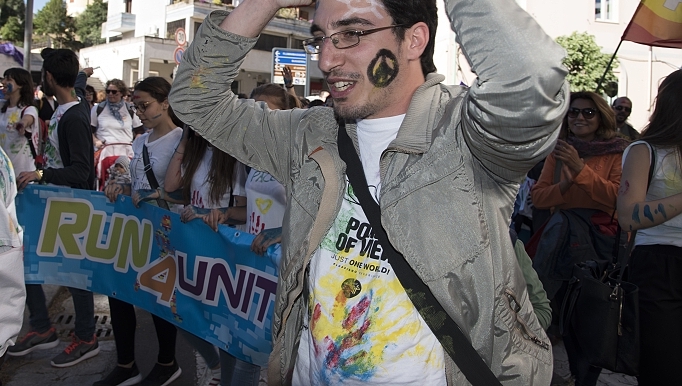
May 29, 2017 | Non categorizzato
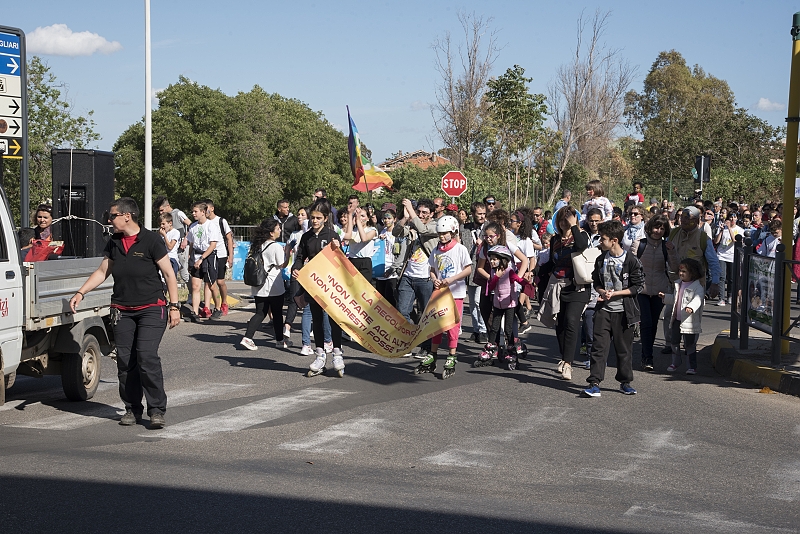 “Yesterday’s breeze brushed the hair and faces of both kids and adults, a colorful slice of humanity saying yes to life and no to the merchants of death. After years of existing in isolation, many groups and organizations came together to start again, in the hope of a visible fraternity.” So read the press release the day after the peace march from its promoters – Focolare, Amnesty International, Oxfam, Fondazione Banca Etica, Opal Brescia, Rete Italiana per il Disarmo – with the support of Comboni missionary Alex Zanotelli. The campaign against arms dealing between Italy and war-torn countries began on March 7, 2017 in Sardinia. The initiative was also part of the worldwide event Run4Unity, promoted by the Young for Unity. Run4Unity takes place each year on the first Sunday of May throughout the globe, during World Unity Week. Arnaldo Scarpa, part of the Focolare Movement in Iglesias and spokesperson for the RWM Conversion Committee together with Cinzia Guaita, explains how the project began. “For many years, there has been a factory in the Domusnovas and Iglesias area whose original work was to produce explosives for nearby mines. Unfortunately the mines were decommissioned, and the factory was converted using public money to produce military equipment. This was then bought and transformed by RWM, a German multinational that produces weapons that are then exported to Saudi Arabia. “So from our country, Italy, arms go out to the ‘pieces of World War III.’ The laws of both countries, Italy and Germany, are quite clear: Law 185/90 in fact prohibits the Italian government to sell arms to countries at war or who do not respect human rights. Yet there has been a continual increase (59%) in Italian exports to North African and Middle Eastern countries in particular. In 2016, RWM’s production rose to almost 22,000, a jump of 1,466%.” At Domusnovas, like in many areas of the island, the main challenge is jobs. “We understood,” Arnaldo continues, “that even our consciences could fall asleep, confused by the general silence, having become groggy from the tragedy of unemployment. Those of us who are committed to living fraternity certainly support the workers, yet we also support the children, teens and adults in Yemen who are killed by what is produced here. Our project has required that we be more courageous than we had ever been in our lives, for many reasons, but it’s already encouraging that there are many people with us who have different backgrounds and ideas.”
“Yesterday’s breeze brushed the hair and faces of both kids and adults, a colorful slice of humanity saying yes to life and no to the merchants of death. After years of existing in isolation, many groups and organizations came together to start again, in the hope of a visible fraternity.” So read the press release the day after the peace march from its promoters – Focolare, Amnesty International, Oxfam, Fondazione Banca Etica, Opal Brescia, Rete Italiana per il Disarmo – with the support of Comboni missionary Alex Zanotelli. The campaign against arms dealing between Italy and war-torn countries began on March 7, 2017 in Sardinia. The initiative was also part of the worldwide event Run4Unity, promoted by the Young for Unity. Run4Unity takes place each year on the first Sunday of May throughout the globe, during World Unity Week. Arnaldo Scarpa, part of the Focolare Movement in Iglesias and spokesperson for the RWM Conversion Committee together with Cinzia Guaita, explains how the project began. “For many years, there has been a factory in the Domusnovas and Iglesias area whose original work was to produce explosives for nearby mines. Unfortunately the mines were decommissioned, and the factory was converted using public money to produce military equipment. This was then bought and transformed by RWM, a German multinational that produces weapons that are then exported to Saudi Arabia. “So from our country, Italy, arms go out to the ‘pieces of World War III.’ The laws of both countries, Italy and Germany, are quite clear: Law 185/90 in fact prohibits the Italian government to sell arms to countries at war or who do not respect human rights. Yet there has been a continual increase (59%) in Italian exports to North African and Middle Eastern countries in particular. In 2016, RWM’s production rose to almost 22,000, a jump of 1,466%.” At Domusnovas, like in many areas of the island, the main challenge is jobs. “We understood,” Arnaldo continues, “that even our consciences could fall asleep, confused by the general silence, having become groggy from the tragedy of unemployment. Those of us who are committed to living fraternity certainly support the workers, yet we also support the children, teens and adults in Yemen who are killed by what is produced here. Our project has required that we be more courageous than we had ever been in our lives, for many reasons, but it’s already encouraging that there are many people with us who have different backgrounds and ideas.”  A positive outcome from the project has been the establishment of the RWM Conversion Committee, to keep the focus on the issue and block the extension of the factory. The area there has natural, environmental and archeological value. There is also the ethical dilemma: some have chosen to not accept work at this factory, even though they are unemployed, while others working inside experience serious crises of conscience. The next step is therefore to lay the foundations for common work on the project, to convert the factory and develop the area differently. Important contacts with entrepreneurs, architects, academics, legal experts, institutions, associations and employee representatives have begun. What is above all essential is that there be a specific political choice at all levels of government. To sign the petition for the Italian president, click here.
A positive outcome from the project has been the establishment of the RWM Conversion Committee, to keep the focus on the issue and block the extension of the factory. The area there has natural, environmental and archeological value. There is also the ethical dilemma: some have chosen to not accept work at this factory, even though they are unemployed, while others working inside experience serious crises of conscience. The next step is therefore to lay the foundations for common work on the project, to convert the factory and develop the area differently. Important contacts with entrepreneurs, architects, academics, legal experts, institutions, associations and employee representatives have begun. What is above all essential is that there be a specific political choice at all levels of government. To sign the petition for the Italian president, click here.
May 29, 2017 | Non categorizzato, Word of
for ages 4-8 | for ages 9-17 | MP3 Audio | Print
In the days following Jesus’ crucifixion, his disciples stayed indoors, fearful and confused. They had followed him along the roads of Palestine, where he proclaimed God’s tender love for each person. Jesus had been sent by the Father, not only to give witness to this love, but also to open for humanity the path to God. He revealed a God who is Trinity, who is a communion of love in himself, and who wants to gather all into this embrace. During the time of his mission, many people saw, heard and experienced Jesus’ good works, his words of welcome, forgiveness and hope … But then came his condemnation and crucifixion. This is the context in St John’s Gospel, where we are told how after he rose again on the third day Jesus appeared to his disciples and sent them out to continue his mission. “As the Father has sent me, so I send you.” It is as if he said, “Do you remember how I shared my life with you? How I satisfied your hunger and thirst for justice and for peace? How I healed the hearts and bodies of so many marginalized people, the outcasts of society? How I defended the dignity of the poor, widows and foreigners? Now you must continue: proclaim the Gospel you have received to everyone. Tell them that God wishes to be met and known by all. Tell them that you are all brothers and sisters.” Each person, created in the image and likeness of God who is love, longs for this encounter. All cultures and societies strive to build relationships of community. But how challenging it is, how many difficulties and obstacles there are to reaching this goal! Every day this deep aspiration runs up against our weakness, our narrowmindedness and fears, our mistrust and judgement of each other. Yet the Lord, with great trust, goes on saying to us as he did in the past: “As the Father has sent me, so I send you.” How can we respond to such a bold invitation? Doesn’t the mission of creating fraternity in a fractured world seem like fighting a losing battle? On our own we will never make it. That is why Jesus gave us the Holy Spirit, as a special gift who sustains our efforts to love each person, even if that person is an enemy. In a Word of Life meditation from 1994, Focolare founder Chiara Lubich wrote, “The Holy Spirit, given to us through baptism … is the spirit of love and unity, who made all believers one in the risen Lord and with one another, overcoming every difference of race, culture and social class … Our selfishness builds barriers of isolation and excludes those who are different from us … So, by listening to the Holy Spirit’s voice, let us try to grow in this fellowship … overcoming the seeds of division carried within us.” With the Holy Spirit’s help this month, every time we interact with others, no matter what it is, let us too remember and practice the words of love: welcome, listen, empathize, dialogue, encourage, include, care, forgive, appreciate someone … In this way, we accept Jesus’ invitation to continue his mission, and we will be channels of the life he gave us. This was the experience of a group of Buddhist monks visiting the international town of Loppiano, Italy, where its 800 inhabitants try to live the Gospel faithfully. They were deeply touched by experiencing Gospel love for the first time. In 1998, Chiara remembered how one of them said: “I put my dusty shoes outside the door; in the morning I found them clean. I put my dirty clothes outside the door; in the morning, I found them washed and ironed. Others knew that I was cold, because I was from Southeast Asia; they raised the temperature and brought me blankets … One day, I asked, ‘Why are you doing this?’ ‘Because we love you, because we love you very much,’ was the answer.’ This experience paved the way for genuine dialogue between Buddhists and Christians. Letizia Magri _____________________________________________ Each month the Focolare offers a Scripture passage as a guide and inspiration for daily living. Focolare’s founder, Chiara Lubich (1920–2008), wrote these commentaries for many years. Now an international commission continues this tradition, faithful to her spirituality of unity. Letizia Magri, an expert in marriage and family from the John Paul II Institute in Rome, is head of this commission and part of the Focolare’s center for the family. This Word of Life is translated into 96 different languages and reaches several million people worldwide through the media. This monthly leaflet is also a supplement to Living City, the Focolare magazine (livingcitymagazine.com). For information and to subscribe to this leaflet or to the magazine, write to: Living City, 202 Comforter Blvd, Hyde Park, NY 12538; tel: 845-229-0496; e-mail: livingcity@livingcitymagazine.com. Visit focolare.org (international) or focolare.us (U.S.). © 2017 by Living City of the Focolare Movement, Inc. Read more: Lubich, Chiara. “The Holy Spirit, the Unknown God,” Essential Writings, New City Press: Hyde Park, New York, 2007, pp. 143–149. Lubich, Chiara. “God is love,” The Art of Loving. New City Press: Hyde Park, New York, 2010, pp. 25–31.
May 28, 2017 | Non categorizzato
“As they looked at him, He was lifted upward, and a cloud hid Him from their eyes” (Acts of the Apostles). The event known as The Ascension, that is, the Transfiguration and passage of Jesus into the kingdom of glory, concludes the visible permanence of God among men. It is a prelude to Pentecost and marks the beginning of Church history. The episode, described by the Gospels of Mark and Luke, and in the Acts of the Apostles, is a very ancient celebration documented since the 4th century. For the Catholic Church and the Protestant Churches, The Ascension is celebrated 40 days after Easter (in the Gregorian calendar, the feast fell on Thursday 25 May). In the Orthodox Church, it is one of the 12 main feasts, and this year it coincides with the Catholic feast.

May 28, 2017 | Non categorizzato
Tax payments “We were expecting our third son. The little money we had saved up suddenly disappeared because of the unfavorable bank exchange rates, and the banks were beginning to stop lending. One day, out of the blue, we were informed that we had to pay a huge amount of taxes. Where would we find the money when we were barely surviving on what little money we had? We entrusted ourselves to God, to the Father who never abandons his children. Then we went to ask for help from the city hall and … surprise! We were the only ones who were given the opportunity of receiving financial assistance.” X. A.- Croatia Sales representative  “I work as a book representative. At my first exhibition I didn’t sell anything. The second time was the same. The third time was even worse: there was no room in the meeting hall and I had to content myself with a bad location downstairs, far from where the people gathered during breaks. There was no lift, so I had to transport the boxes in arms, sweating because of the incredible heat. Meanwhile I caught myself saying: ‘Who’s making you do this?’ Passing a chapel, I stopped in to vent with Jesus, who seemed to say to me from the tabernacle: ‘What are you doing?’ ‘God’s will,’ was my answer. ‘Well, relax then and I’ll take care of it now.’ I had to use chairs at the exhibit because there were no tables. A priest walked by and noticed a volume of a volume from a set of encyclopedias on the Saints. He exclaimed: ‘It’s not possible! I’ve been looking for that for years!’ He bought it and, after that, I didn’t stop selling.” Marta – Italy Be like a father “My father left my mother before I was born. I suffered because of his absence and never forgave him for going away. When I was around 17 years old I went looking for him, hoping to renew a relationship that never really existed. Unfortunately I was met by indifference, and his relationship with his wife wasn’t going well either. During that period I got to know young people who were living the Gospel and, through them, I got to know God better. Later, during my university studies, I began to work on a social project that put me in contact with abandoned children. The pain I had gone through had made me more sensible to the pain of others in whom I tried to love Jesus. Little by little, I became a reference point for many of those little ones, to the point that they started calling me Papa. As for the relationship with my father, it’s still a challenge: I try to see him with new eyes every time, always taking the first step.” J. L. – Brazil
“I work as a book representative. At my first exhibition I didn’t sell anything. The second time was the same. The third time was even worse: there was no room in the meeting hall and I had to content myself with a bad location downstairs, far from where the people gathered during breaks. There was no lift, so I had to transport the boxes in arms, sweating because of the incredible heat. Meanwhile I caught myself saying: ‘Who’s making you do this?’ Passing a chapel, I stopped in to vent with Jesus, who seemed to say to me from the tabernacle: ‘What are you doing?’ ‘God’s will,’ was my answer. ‘Well, relax then and I’ll take care of it now.’ I had to use chairs at the exhibit because there were no tables. A priest walked by and noticed a volume of a volume from a set of encyclopedias on the Saints. He exclaimed: ‘It’s not possible! I’ve been looking for that for years!’ He bought it and, after that, I didn’t stop selling.” Marta – Italy Be like a father “My father left my mother before I was born. I suffered because of his absence and never forgave him for going away. When I was around 17 years old I went looking for him, hoping to renew a relationship that never really existed. Unfortunately I was met by indifference, and his relationship with his wife wasn’t going well either. During that period I got to know young people who were living the Gospel and, through them, I got to know God better. Later, during my university studies, I began to work on a social project that put me in contact with abandoned children. The pain I had gone through had made me more sensible to the pain of others in whom I tried to love Jesus. Little by little, I became a reference point for many of those little ones, to the point that they started calling me Papa. As for the relationship with my father, it’s still a challenge: I try to see him with new eyes every time, always taking the first step.” J. L. – Brazil
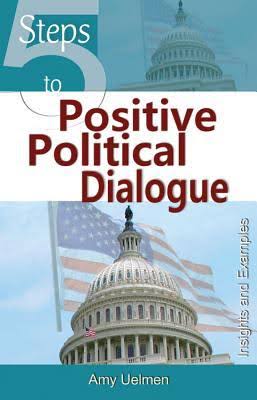
May 27, 2017 | Non categorizzato
 Over the course of the past year, ideological tension that had been simmering for decades broke out into the open. In the months leading up to the November election, people from every position on the political spectrum expressed deep concerns about the direction the country was heading. Throughout the States, strong and contrasting emotions generated a general sense of unease and division. Such feelings affected relationships in local Focolare communities as well. Many felt that the presidential election campaign forced them to make impossibly difficult choices. Conversations became heated and difficult. Anticipating this possibility, throughout 2015 the Focolare Movement had sponsored workshops based on the New City Press book, Five Steps to Positive Political Dialogue. During these workshops, participants learned and practiced the necessary skills for positive dialogue across political differences. The “five steps” include:
Over the course of the past year, ideological tension that had been simmering for decades broke out into the open. In the months leading up to the November election, people from every position on the political spectrum expressed deep concerns about the direction the country was heading. Throughout the States, strong and contrasting emotions generated a general sense of unease and division. Such feelings affected relationships in local Focolare communities as well. Many felt that the presidential election campaign forced them to make impossibly difficult choices. Conversations became heated and difficult. Anticipating this possibility, throughout 2015 the Focolare Movement had sponsored workshops based on the New City Press book, Five Steps to Positive Political Dialogue. During these workshops, participants learned and practiced the necessary skills for positive dialogue across political differences. The “five steps” include:
- Believe that a Positive Vision is Possible
- Practice Communication Skills Based on Love
- Understand Where There Is Room for Compromise—and Not
- Recognize Suffering as a Springboard for Love
- Build Relationships with Positive Action.
John Chesser (Iowa): “People paired off and they chose to discuss a topic on which they strongly disagreed. The twist was first one person shared their view and then the other person had to repeat their view back before sharing his or her own view. The results were really interesting. The exercise allowed people to gain an appreciation not just for the other person’s point of view but to reflect and reconsider their own view. Of course we didn’t solve the world’s problems in the workshops but we did find new hope and new tools that helped us to see that maybe it’s possible for us to solve these problems with dialogue.” As the November 2016 election drew near, the tension between those who held opposing opinions seemed to increase by the day, and conflict became more and more pronounced in personal life, in workplaces, and in social media communications. Marilyn Boesch (Maryland): “I was very agitated. And I remember examining my conscience, affirming my desire to work for unity, to be a person that builds bridges, not a person resigned to these divisions.” Marijo Dulay (New York): “After a few mistakes I learned to be more sensitive in the comments that I posted on Facebook so as not to hurt the people who differed from my perspective.” Simona Lucchi (Georgia): “I realized that all my preaching and all my yelling wasn’t doing any good because either way it wasn’t changing what people believed in. So I took the stance of sitting back in order to listen. When I stopped talking to actually listen, I found that I had more in common than I thought with the people I disagreed with.” 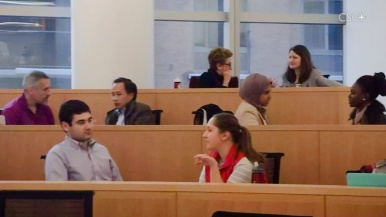 Amid the confusion, the positive proposals for dialogue presented in academic environments were well received. For example, at Fordham Law School, in the heart of Manhattan, New York, Ana Renata Dias, the Director of the Institute on Religion, Law & Lawyer’s Work, offered a workshop that aimed to promote open and constructive cultural dialogue by honing the participants’ listening skills. “Several of the participants said they had come to the workshop because they wanted to understand if dialogue is really possible among such polarization.” After a listening to a presentation with practical suggestions for approaching these difficult conversations, participants rolled up their sleeves and got to work, discovering together that even those who were most impassioned could find ways to exchange contrasting views without the conversation degenerating into a fight. Even those who said they were less than convinced by the workshop felt more hopeful. Two months later, following the inauguration of the new president, cultural tensions became more and more pronounced. Students at Georgetown Law School in Washington, DC were searching for ways to navigate these tumultuous waters. Amy Uelmen, author of the book, Five Steps to Positive Political Dialogue: Insights and Examples, proposed to her class a way forward.
Amid the confusion, the positive proposals for dialogue presented in academic environments were well received. For example, at Fordham Law School, in the heart of Manhattan, New York, Ana Renata Dias, the Director of the Institute on Religion, Law & Lawyer’s Work, offered a workshop that aimed to promote open and constructive cultural dialogue by honing the participants’ listening skills. “Several of the participants said they had come to the workshop because they wanted to understand if dialogue is really possible among such polarization.” After a listening to a presentation with practical suggestions for approaching these difficult conversations, participants rolled up their sleeves and got to work, discovering together that even those who were most impassioned could find ways to exchange contrasting views without the conversation degenerating into a fight. Even those who said they were less than convinced by the workshop felt more hopeful. Two months later, following the inauguration of the new president, cultural tensions became more and more pronounced. Students at Georgetown Law School in Washington, DC were searching for ways to navigate these tumultuous waters. Amy Uelmen, author of the book, Five Steps to Positive Political Dialogue: Insights and Examples, proposed to her class a way forward. 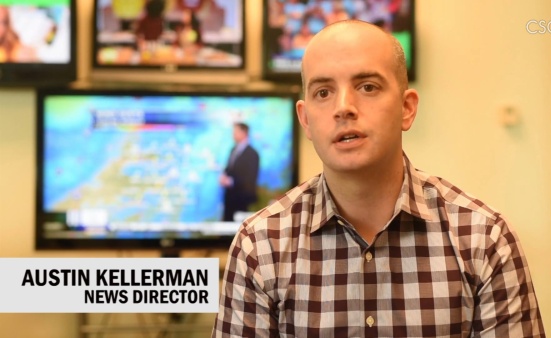 “We realized that often in any conversation there will be caricatures, mischaracterizations, misunderstandings, and information that is simply wrong. We agreed all together to be open to correction and to working out our difficulties when different perspectives collide.” In Arkansas, a traditionally conservative state, some were enthusiastic about the election of the new president while others were angry. Austin Kellerman leads a newsroom in Little Rock, the state’s capital. Together, he and his colleagues decided to launch an appeal for unity. “Our team of journalists felt like we had the chance to be a voice for our city, so in one of the more heated moments one of our more experienced reporters put together a commentary calling for unity and an open mind: he said, ‘There is no them, no us. There is We. We the people.’” “Obviously, this alone will not fix things or change anybody’s view,” Kellerman continues, “but hopefully it gives people permission to think beyond their singular view. We are going to try to keep the dialogue going and staying faithful to representing all sides and voices.” Source: New City Press (New York)
“We realized that often in any conversation there will be caricatures, mischaracterizations, misunderstandings, and information that is simply wrong. We agreed all together to be open to correction and to working out our difficulties when different perspectives collide.” In Arkansas, a traditionally conservative state, some were enthusiastic about the election of the new president while others were angry. Austin Kellerman leads a newsroom in Little Rock, the state’s capital. Together, he and his colleagues decided to launch an appeal for unity. “Our team of journalists felt like we had the chance to be a voice for our city, so in one of the more heated moments one of our more experienced reporters put together a commentary calling for unity and an open mind: he said, ‘There is no them, no us. There is We. We the people.’” “Obviously, this alone will not fix things or change anybody’s view,” Kellerman continues, “but hopefully it gives people permission to think beyond their singular view. We are going to try to keep the dialogue going and staying faithful to representing all sides and voices.” Source: New City Press (New York)
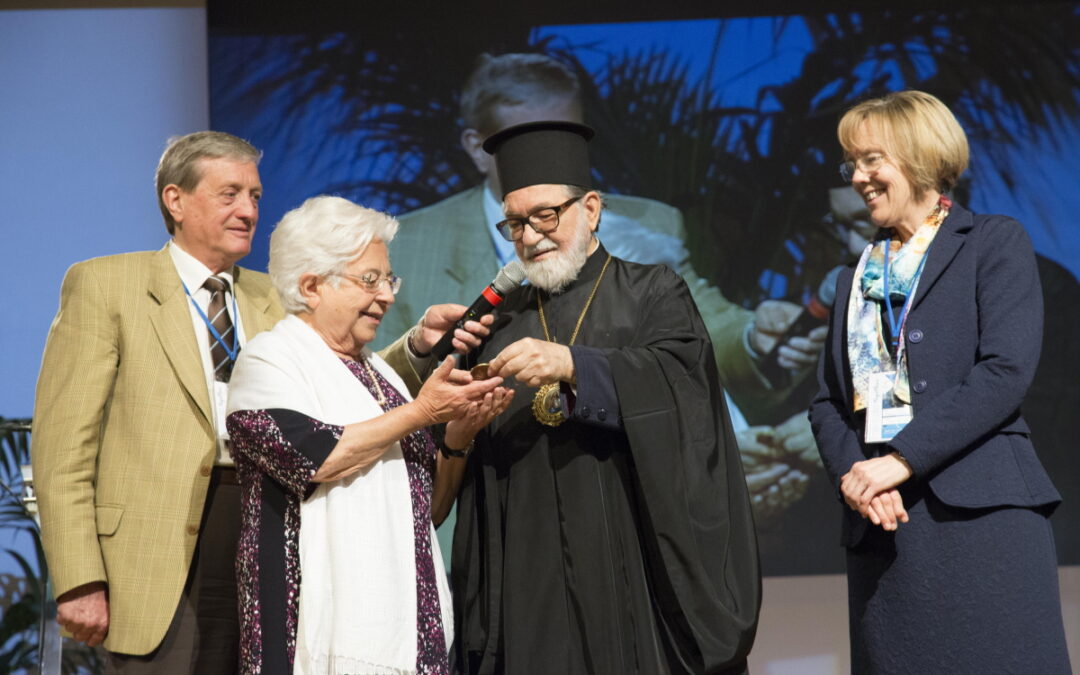
May 26, 2017 | Non categorizzato
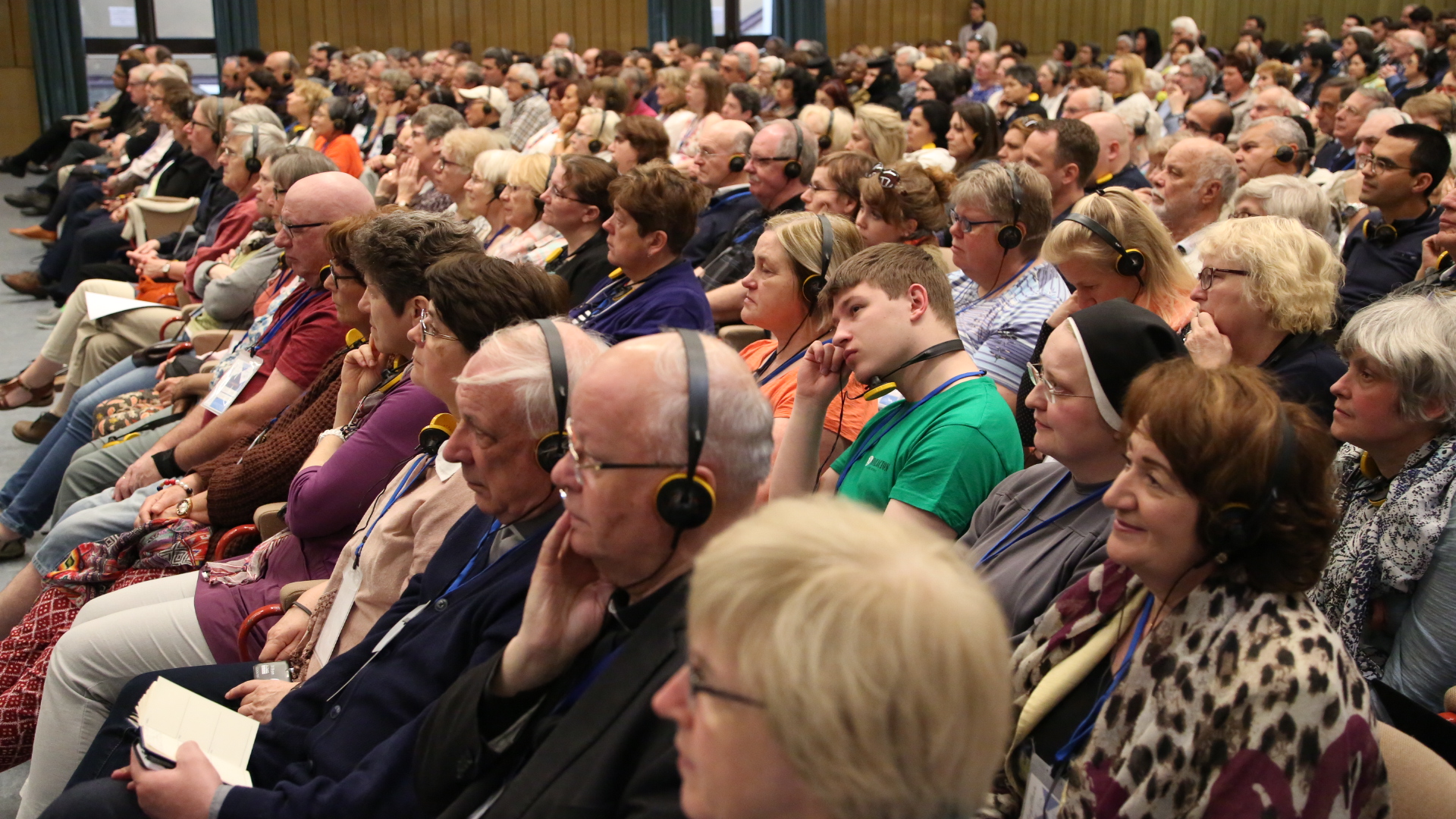
© CSC Audiovisivi – Caris Mendes
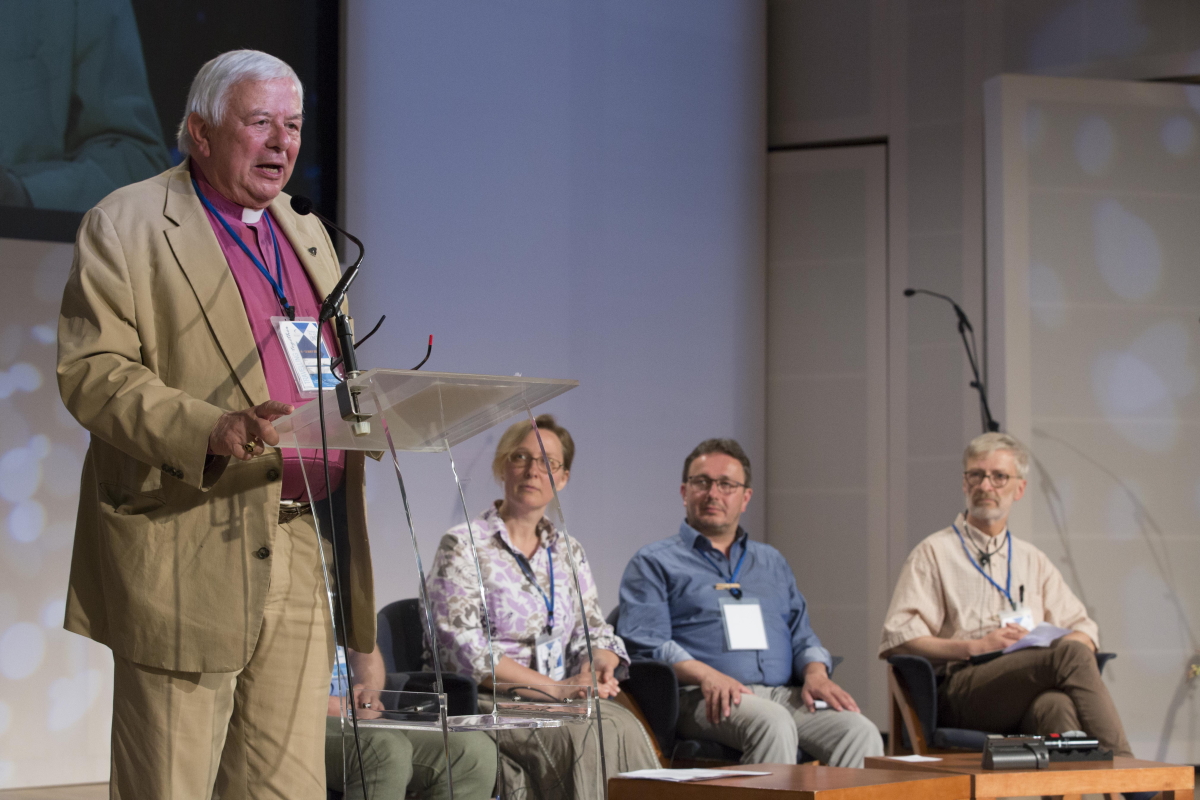
Emeritus Bishop Christian Krause,
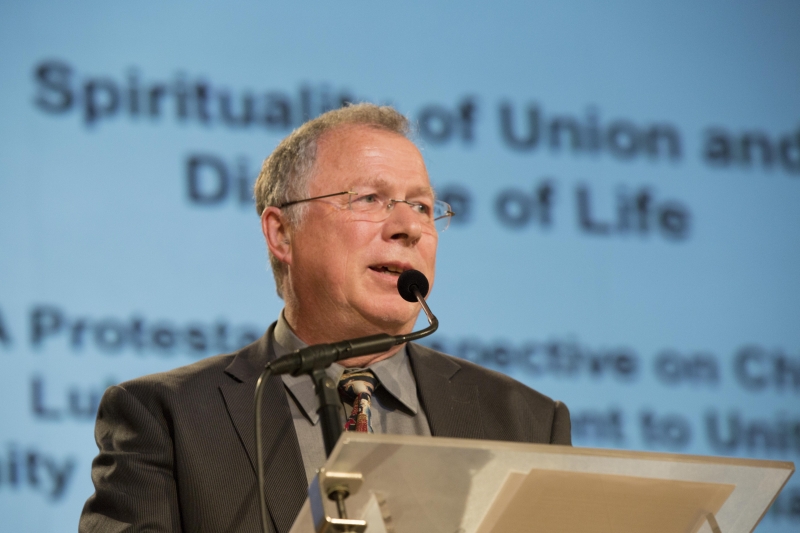
Rev Dr Martin Robra (WCC)
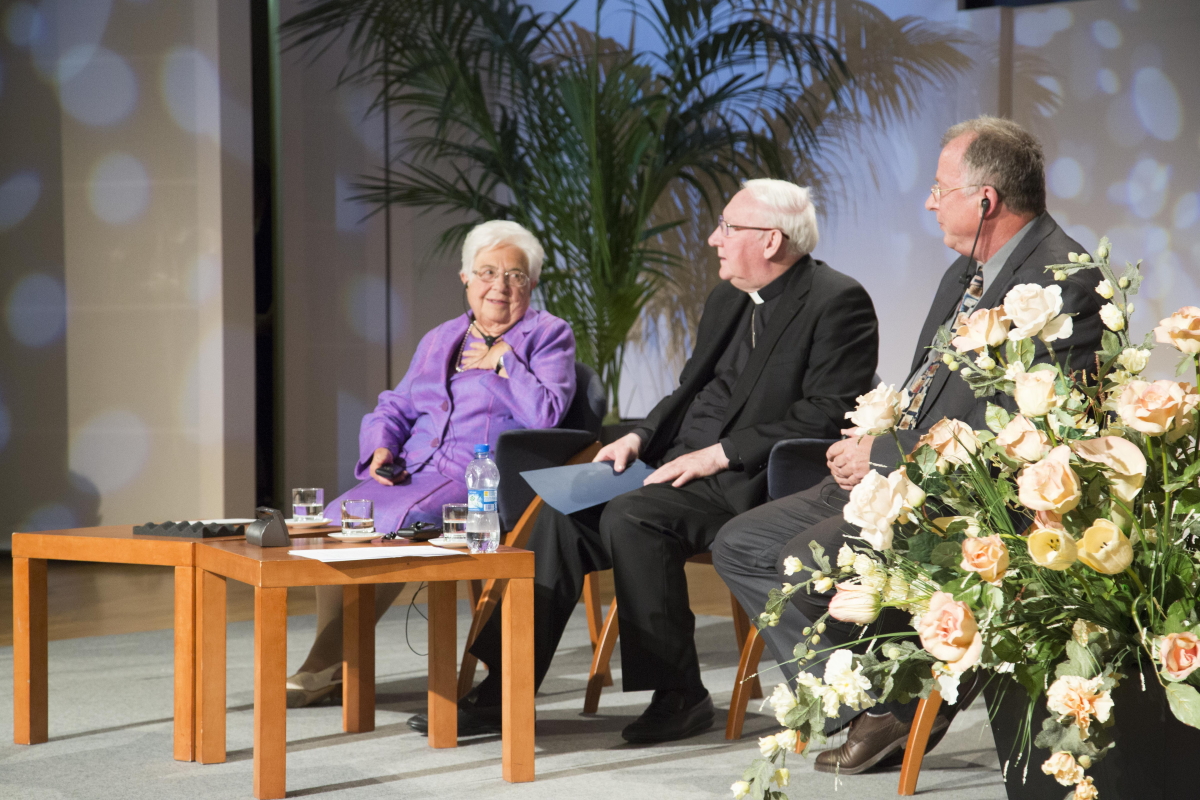
Maria Voce with Bishop Brian Farrel
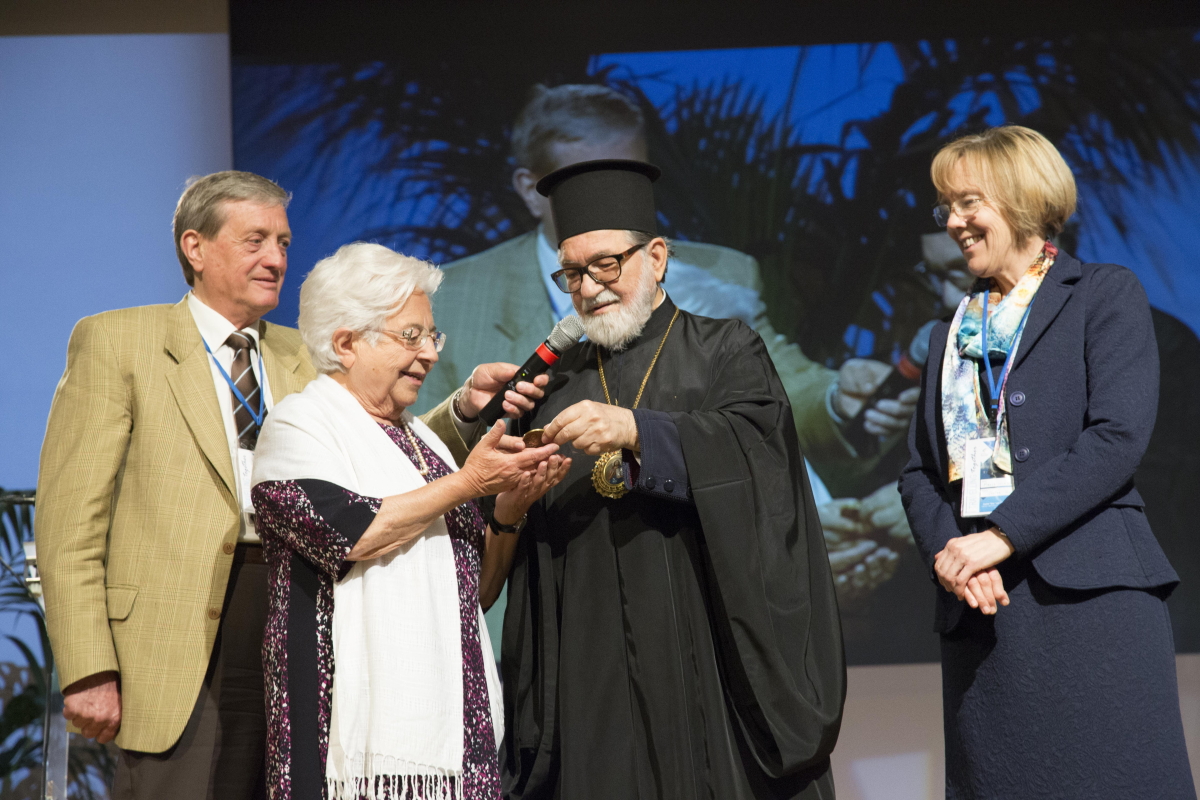
The Metropolitan Gennadios Zervos presented an “Historic Medal” to the president of the Focolare
May 26, 2017 | Non categorizzato
For Muslims, May 26 signals the start of the Sacred Month of Ramadan. It is the ninth month of the Islamic year and the most important. It is a sacred time during which the revelation of the Koran to the Prophet Muhammad is commemorated and through fasting (the fourth pillar of the Muslim faith), a special purification is sought. Ramadan is a month of total fasting from dawn to dusk.
May 25, 2017 | Non categorizzato
The meeting, promoted by the Focolare Movement, will focus on Synodality. The meeting is open to priests, deacons, men and women religious, ministers of various churches and lay people, both young people and adults, who are interested in parish life. For more details and registration contact your nearest Focolare Centre or write to email address: netwalking2017 @ focolare.org Invitation (Italian)
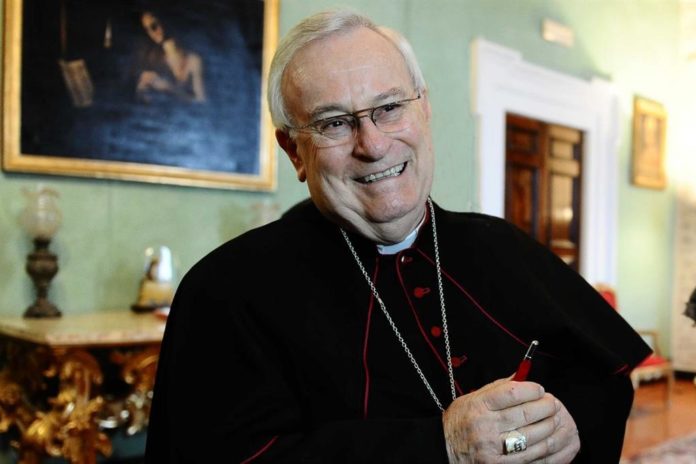
May 25, 2017 | Focolare Worldwide, Senza categoria
 Maria Voce says that it was “with great pleasure” that she learnt of Cardinal Gualtiero Bassetti’s appointment as new President of the Italian Episcopal Conference (CEI) on May 24, 2017. In a letter congratulating him, the President of the Focolare Movement expresses her “most sincere wishes for this prestigious assignment, a clear sign of trust on behalf of the Holy Father.” “His sense of collegiality and love, which are his trademarks,” continues the President, “will be a great gift for the entire ecclesial and civil community of Italy, especially for those who most resemble Jesus Crucified and Abandoned “. The Focolare Movement in Italy also congratulated the new President of the Bishops’ Conference, saying his appointment is “a source of great joy”. In a press release, it emphasizes his “particular style in always being close to the people, to workers, migrants, families, in their situations of crisis and in their search for truth.” The Movement wishes that he may “experience in this new task an ever-renewed courage to face the countless challenges, comforted by the collegiality which is a witness to the fraternal aspect of the Church.” Born in 1942 in Marradi near Florence, Gualtiero Bassetti was ordained a priest in 1966. In 1994 he was appointed Bishop of Massa Marittima, then Bishop of Arezzo (1998) and in 2009 Archbishop of Perugia. In 2014, Pope Francis welcomed him into the College of Cardinals.
Maria Voce says that it was “with great pleasure” that she learnt of Cardinal Gualtiero Bassetti’s appointment as new President of the Italian Episcopal Conference (CEI) on May 24, 2017. In a letter congratulating him, the President of the Focolare Movement expresses her “most sincere wishes for this prestigious assignment, a clear sign of trust on behalf of the Holy Father.” “His sense of collegiality and love, which are his trademarks,” continues the President, “will be a great gift for the entire ecclesial and civil community of Italy, especially for those who most resemble Jesus Crucified and Abandoned “. The Focolare Movement in Italy also congratulated the new President of the Bishops’ Conference, saying his appointment is “a source of great joy”. In a press release, it emphasizes his “particular style in always being close to the people, to workers, migrants, families, in their situations of crisis and in their search for truth.” The Movement wishes that he may “experience in this new task an ever-renewed courage to face the countless challenges, comforted by the collegiality which is a witness to the fraternal aspect of the Church.” Born in 1942 in Marradi near Florence, Gualtiero Bassetti was ordained a priest in 1966. In 1994 he was appointed Bishop of Massa Marittima, then Bishop of Arezzo (1998) and in 2009 Archbishop of Perugia. In 2014, Pope Francis welcomed him into the College of Cardinals.
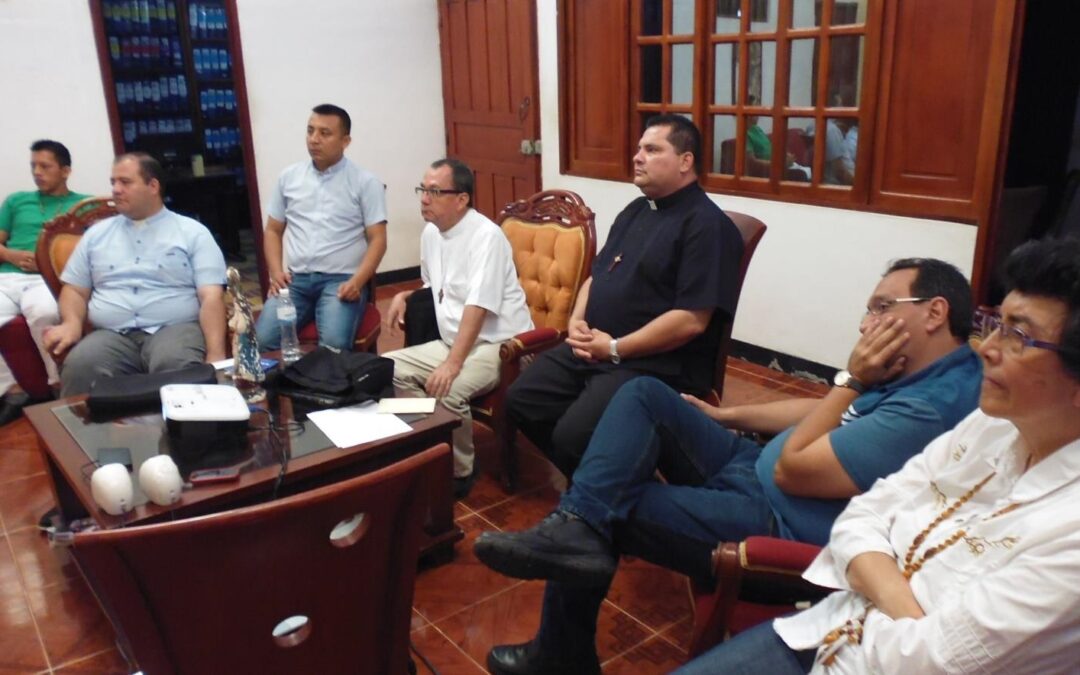
May 25, 2017 | Focolare Worldwide
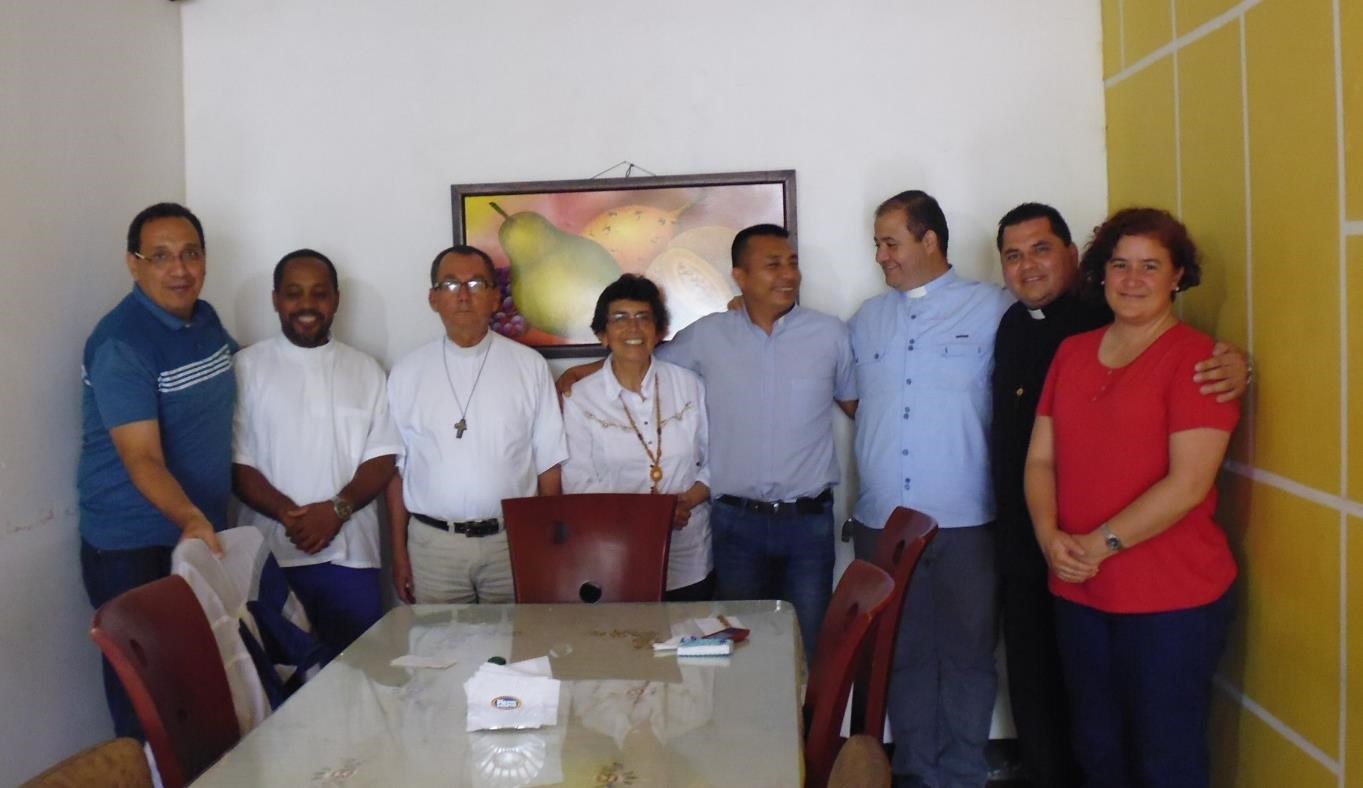 Elizabeth and Allejandra from the women’s focolare in Bogota write: “We went to Mocoa with Fr Juan Carlos Almario, a priest and a focolarino, to take monies to them that had been collected by the Focolare community of Colombia. We were there in the name of the entire Focolare family, to take them their love, prayers and concrete assistance, not only from the community in Colombia but also from many parts of the world that had become involved in this tragedy.” “Several priests from the Movement – pastors from Mocoa – welcomed us with much joy. Then we met the people. Every one of them had a painful story to tell us that was linked to the catastrophe, and we wept with them.” They recalled that April 1st night, the mudslides and the “love race” that broke out among them in reaching the victims. The priests and their bishop, Luis Maldonado, along with other parish priests, got organized to stand by the wounded in the hospitals, to welcome families in search of loved ones and to bury their dead… Then, with the help of other parishioners they set up a canteen to provide meals for people who were without water and electricity, and to share with the public workers that were involved in the relief effort. They arranged the assistance materials as they arrived, so that they could be distributed to those in need, along with surgical masks to protect from the overpowering odours. “The recount of their efforts had a strong Marian quality, silent but concrete, that reached the people through them and met many of the needs that resulted from the tragedy.”
Elizabeth and Allejandra from the women’s focolare in Bogota write: “We went to Mocoa with Fr Juan Carlos Almario, a priest and a focolarino, to take monies to them that had been collected by the Focolare community of Colombia. We were there in the name of the entire Focolare family, to take them their love, prayers and concrete assistance, not only from the community in Colombia but also from many parts of the world that had become involved in this tragedy.” “Several priests from the Movement – pastors from Mocoa – welcomed us with much joy. Then we met the people. Every one of them had a painful story to tell us that was linked to the catastrophe, and we wept with them.” They recalled that April 1st night, the mudslides and the “love race” that broke out among them in reaching the victims. The priests and their bishop, Luis Maldonado, along with other parish priests, got organized to stand by the wounded in the hospitals, to welcome families in search of loved ones and to bury their dead… Then, with the help of other parishioners they set up a canteen to provide meals for people who were without water and electricity, and to share with the public workers that were involved in the relief effort. They arranged the assistance materials as they arrived, so that they could be distributed to those in need, along with surgical masks to protect from the overpowering odours. “The recount of their efforts had a strong Marian quality, silent but concrete, that reached the people through them and met many of the needs that resulted from the tragedy.” 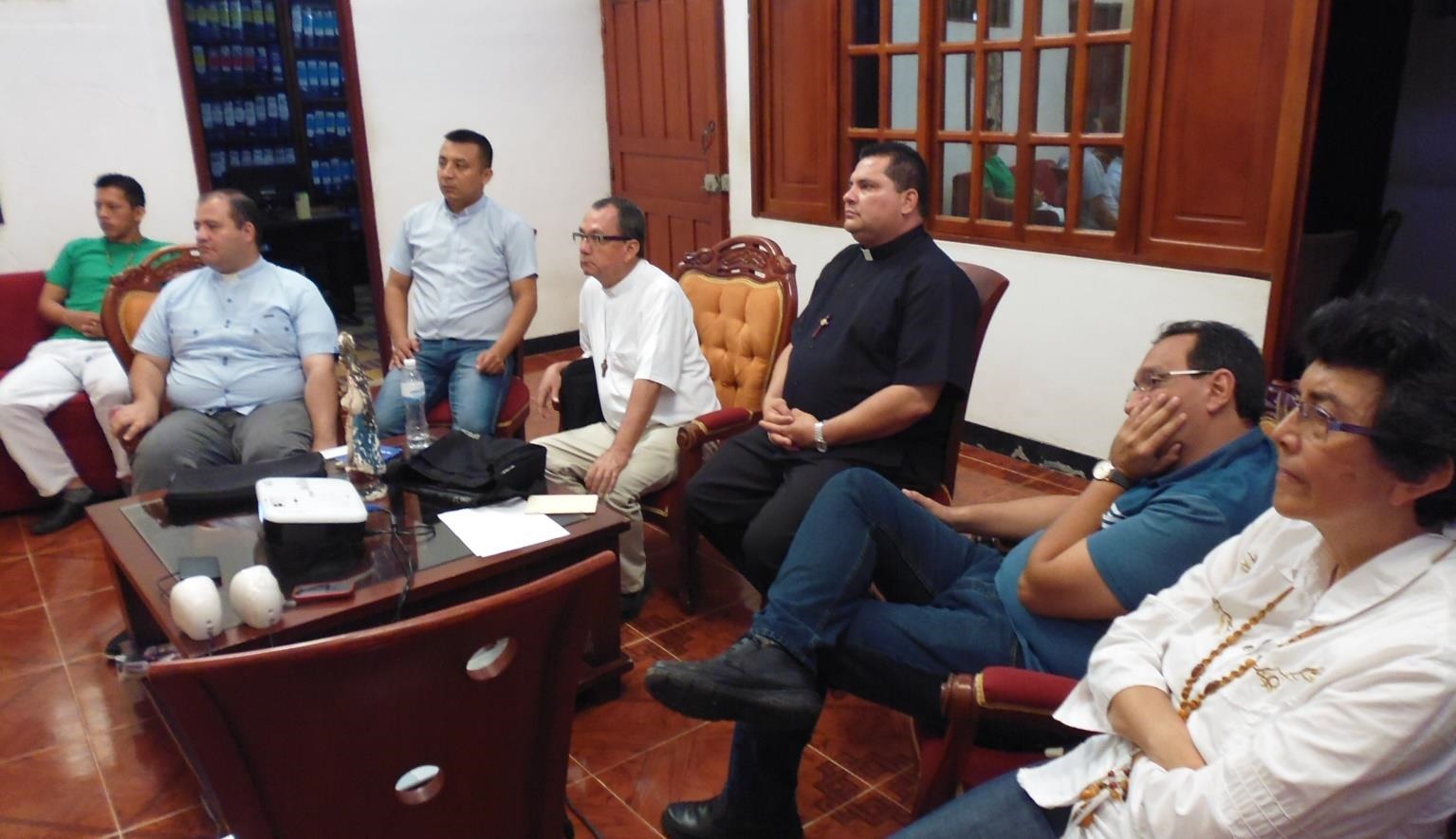 “We wanted to keep in our hearts the topic that the entire Movement is focusing on this year, and it seemed so in tune with the situation we found ourselves in: Jesus Forsaken.” In the spontaneous communion that was born, each one of us sought to see the suffering that was being experienced, seeing in it a face of the infinite suffering Jesus experienced on the Cross, which gives meaning to so much suffering.” One of the priests said, during lunch, that those hours spent with each other were like an “oases” that managed to detach him from the nightmare. “Then, together with Fr Oscar, we travelled around the places that were hit by the mudslides, some quarters completely wiped out. Others had been turned into cemeteries with houses demolished by huge boulders, with uprooted trees everywhere. The love, prayers and assistance reached all the way to Mocoa as it goes through this living hell, and it helped to uplift the victims of this tragedy somewhat. The trip also included a visit to the city of Neiva in southern Colombia: “We wanted to visit our local Focolare community and, with them, to prepare for the upcoming Mariapolis that will be held in July at an archaeological park where there are intact remains of some of the most ancient indigenous cultures.” Amidst the pain and suffering of natural distaster, the Focolare in Colombia is focused on the future. See also:News from Colombia
“We wanted to keep in our hearts the topic that the entire Movement is focusing on this year, and it seemed so in tune with the situation we found ourselves in: Jesus Forsaken.” In the spontaneous communion that was born, each one of us sought to see the suffering that was being experienced, seeing in it a face of the infinite suffering Jesus experienced on the Cross, which gives meaning to so much suffering.” One of the priests said, during lunch, that those hours spent with each other were like an “oases” that managed to detach him from the nightmare. “Then, together with Fr Oscar, we travelled around the places that were hit by the mudslides, some quarters completely wiped out. Others had been turned into cemeteries with houses demolished by huge boulders, with uprooted trees everywhere. The love, prayers and assistance reached all the way to Mocoa as it goes through this living hell, and it helped to uplift the victims of this tragedy somewhat. The trip also included a visit to the city of Neiva in southern Colombia: “We wanted to visit our local Focolare community and, with them, to prepare for the upcoming Mariapolis that will be held in July at an archaeological park where there are intact remains of some of the most ancient indigenous cultures.” Amidst the pain and suffering of natural distaster, the Focolare in Colombia is focused on the future. See also:News from Colombia

 “Yesterday’s breeze brushed the hair and faces of both kids and adults, a colorful slice of humanity saying yes to life and no to the merchants of death. After years of existing in isolation, many groups and organizations came together to start again, in the hope of a visible fraternity.” So read the press release the day after the peace march from its promoters – Focolare, Amnesty International, Oxfam, Fondazione Banca Etica, Opal Brescia, Rete Italiana per il Disarmo – with the support of Comboni missionary Alex Zanotelli. The campaign against arms dealing between Italy and war-torn countries began on March 7, 2017 in Sardinia. The initiative was also part of the worldwide event Run4Unity, promoted by the Young for Unity. Run4Unity takes place each year on the first Sunday of May throughout the globe, during World Unity Week. Arnaldo Scarpa, part of the Focolare Movement in Iglesias and spokesperson for the RWM Conversion Committee together with Cinzia Guaita, explains how the project began. “For many years, there has been a factory in the Domusnovas and Iglesias area whose original work was to produce explosives for nearby mines. Unfortunately the mines were decommissioned, and the factory was converted using public money to produce military equipment. This was then bought and transformed by RWM, a German multinational that produces weapons that are then exported to Saudi Arabia. “So from our country, Italy, arms go out to the ‘pieces of World War III.’ The laws of both countries, Italy and Germany, are quite clear: Law 185/90 in fact prohibits the Italian government to sell arms to countries at war or who do not respect human rights. Yet there has been a continual increase (59%) in Italian exports to North African and Middle Eastern countries in particular. In 2016, RWM’s production rose to almost 22,000, a jump of 1,466%.” At Domusnovas, like in many areas of the island, the main challenge is jobs. “We understood,” Arnaldo continues, “that even our consciences could fall asleep, confused by the general silence, having become groggy from the tragedy of unemployment. Those of us who are committed to living fraternity certainly support the workers, yet we also support the children, teens and adults in Yemen who are killed by what is produced here. Our project has required that we be more courageous than we had ever been in our lives, for many reasons, but it’s already encouraging that there are many people with us who have different backgrounds and ideas.”
“Yesterday’s breeze brushed the hair and faces of both kids and adults, a colorful slice of humanity saying yes to life and no to the merchants of death. After years of existing in isolation, many groups and organizations came together to start again, in the hope of a visible fraternity.” So read the press release the day after the peace march from its promoters – Focolare, Amnesty International, Oxfam, Fondazione Banca Etica, Opal Brescia, Rete Italiana per il Disarmo – with the support of Comboni missionary Alex Zanotelli. The campaign against arms dealing between Italy and war-torn countries began on March 7, 2017 in Sardinia. The initiative was also part of the worldwide event Run4Unity, promoted by the Young for Unity. Run4Unity takes place each year on the first Sunday of May throughout the globe, during World Unity Week. Arnaldo Scarpa, part of the Focolare Movement in Iglesias and spokesperson for the RWM Conversion Committee together with Cinzia Guaita, explains how the project began. “For many years, there has been a factory in the Domusnovas and Iglesias area whose original work was to produce explosives for nearby mines. Unfortunately the mines were decommissioned, and the factory was converted using public money to produce military equipment. This was then bought and transformed by RWM, a German multinational that produces weapons that are then exported to Saudi Arabia. “So from our country, Italy, arms go out to the ‘pieces of World War III.’ The laws of both countries, Italy and Germany, are quite clear: Law 185/90 in fact prohibits the Italian government to sell arms to countries at war or who do not respect human rights. Yet there has been a continual increase (59%) in Italian exports to North African and Middle Eastern countries in particular. In 2016, RWM’s production rose to almost 22,000, a jump of 1,466%.” At Domusnovas, like in many areas of the island, the main challenge is jobs. “We understood,” Arnaldo continues, “that even our consciences could fall asleep, confused by the general silence, having become groggy from the tragedy of unemployment. Those of us who are committed to living fraternity certainly support the workers, yet we also support the children, teens and adults in Yemen who are killed by what is produced here. Our project has required that we be more courageous than we had ever been in our lives, for many reasons, but it’s already encouraging that there are many people with us who have different backgrounds and ideas.”  A positive outcome from the project has been the establishment of the RWM Conversion Committee, to keep the focus on the issue and block the extension of the factory. The area there has natural, environmental and archeological value. There is also the ethical dilemma: some have chosen to not accept work at this factory, even though they are unemployed, while others working inside experience serious crises of conscience. The next step is therefore to lay the foundations for common work on the project, to convert the factory and develop the area differently. Important contacts with entrepreneurs, architects, academics, legal experts, institutions, associations and employee representatives have begun. What is above all essential is that there be a specific political choice at all levels of government. To sign the petition for the Italian president, click here.
A positive outcome from the project has been the establishment of the RWM Conversion Committee, to keep the focus on the issue and block the extension of the factory. The area there has natural, environmental and archeological value. There is also the ethical dilemma: some have chosen to not accept work at this factory, even though they are unemployed, while others working inside experience serious crises of conscience. The next step is therefore to lay the foundations for common work on the project, to convert the factory and develop the area differently. Important contacts with entrepreneurs, architects, academics, legal experts, institutions, associations and employee representatives have begun. What is above all essential is that there be a specific political choice at all levels of government. To sign the petition for the Italian president, click here.


 Amid the confusion, the positive proposals for dialogue presented in academic environments were well received. For example, at Fordham Law School, in the heart of Manhattan, New York, Ana Renata Dias, the Director of the Institute on Religion, Law & Lawyer’s Work, offered a workshop that aimed to promote open and constructive cultural dialogue by honing the participants’ listening skills. “Several of the participants said they had come to the workshop because they wanted to understand if dialogue is really possible among such polarization.” After a listening to a presentation with practical suggestions for approaching these difficult conversations, participants rolled up their sleeves and got to work, discovering together that even those who were most impassioned could find ways to exchange contrasting views without the conversation degenerating into a fight. Even those who said they were less than convinced by the workshop felt more hopeful. Two months later, following the inauguration of the new president, cultural tensions became more and more pronounced. Students at Georgetown Law School in Washington, DC were searching for ways to navigate these tumultuous waters. Amy Uelmen, author of the book, Five Steps to Positive Political Dialogue: Insights and Examples, proposed to her class a way forward.
Amid the confusion, the positive proposals for dialogue presented in academic environments were well received. For example, at Fordham Law School, in the heart of Manhattan, New York, Ana Renata Dias, the Director of the Institute on Religion, Law & Lawyer’s Work, offered a workshop that aimed to promote open and constructive cultural dialogue by honing the participants’ listening skills. “Several of the participants said they had come to the workshop because they wanted to understand if dialogue is really possible among such polarization.” After a listening to a presentation with practical suggestions for approaching these difficult conversations, participants rolled up their sleeves and got to work, discovering together that even those who were most impassioned could find ways to exchange contrasting views without the conversation degenerating into a fight. Even those who said they were less than convinced by the workshop felt more hopeful. Two months later, following the inauguration of the new president, cultural tensions became more and more pronounced. Students at Georgetown Law School in Washington, DC were searching for ways to navigate these tumultuous waters. Amy Uelmen, author of the book, Five Steps to Positive Political Dialogue: Insights and Examples, proposed to her class a way forward.  “We realized that often in any conversation there will be caricatures, mischaracterizations, misunderstandings, and information that is simply wrong. We agreed all together to be open to correction and to working out our difficulties when different perspectives collide.” In Arkansas, a traditionally conservative state, some were enthusiastic about the election of the new president while others were angry. Austin Kellerman leads a newsroom in Little Rock, the state’s capital. Together, he and his colleagues decided to launch an appeal for unity. “Our team of journalists felt like we had the chance to be a voice for our city, so in one of the more heated moments one of our more experienced reporters put together a commentary calling for unity and an open mind: he said, ‘There is no them, no us. There is We. We the people.’” “Obviously, this alone will not fix things or change anybody’s view,” Kellerman continues, “but hopefully it gives people permission to think beyond their singular view. We are going to try to keep the dialogue going and staying faithful to representing all sides and voices.” Source:
“We realized that often in any conversation there will be caricatures, mischaracterizations, misunderstandings, and information that is simply wrong. We agreed all together to be open to correction and to working out our difficulties when different perspectives collide.” In Arkansas, a traditionally conservative state, some were enthusiastic about the election of the new president while others were angry. Austin Kellerman leads a newsroom in Little Rock, the state’s capital. Together, he and his colleagues decided to launch an appeal for unity. “Our team of journalists felt like we had the chance to be a voice for our city, so in one of the more heated moments one of our more experienced reporters put together a commentary calling for unity and an open mind: he said, ‘There is no them, no us. There is We. We the people.’” “Obviously, this alone will not fix things or change anybody’s view,” Kellerman continues, “but hopefully it gives people permission to think beyond their singular view. We are going to try to keep the dialogue going and staying faithful to representing all sides and voices.” Source: 







